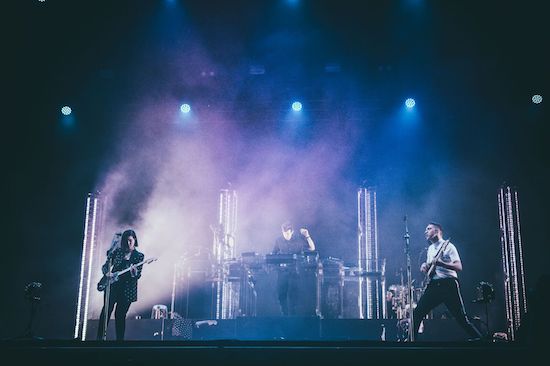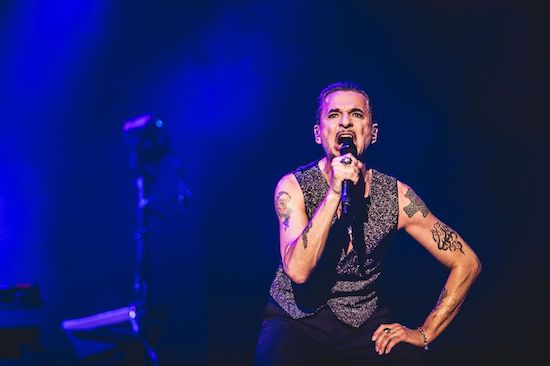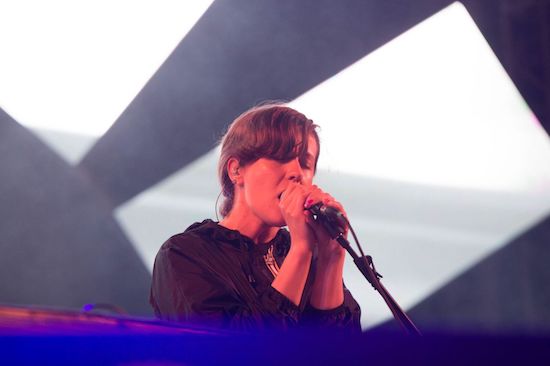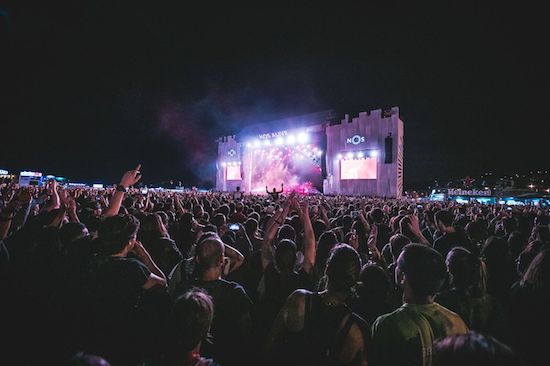The festival circuit is long and peculiar. Like Lisbon itself, it presents with a theoretical grid-like authority but — in reality — is defined by an interconnecting maze of unknowable and innumerable side streets and backroads. NOS Alive, unquestionably a huge festival, is not exactly the exception to this rule: it is, after all, one of Europe’s main roads on the summer music circuit, featuring big names from Fleet Foxes and The Weeknd to Depeche Mode and Phoenix — but endeavours to be something more than the more obvious sum of its parts.
With a vast area by the port at its disposal, the concrete and astroturf surrounds of NOS Alive aren’t what you might obviously describe as homely — the thronging crowds don’t exactly suggest intimacy either — but the festival makes amends by railing heavily against itself; from the booking of smaller Portuguese acts to the spread of stages which creates the illusion of space, through to the food, drink and other salves available (as well, of course, as their stellar treatment of rowdy international journalists), NOS looks to create a familial environment where there ought not to be one.
And, to its credit, the Portuguese festival manages this better than even some smaller festivals for whom it is their only USP — it’s partly a question of music, of course, and which we’ll get to in just a moment; but it’s also very much a question of people — of the fact that the people here want to be here and the people who organise NOS Alive want them to be here for more personal reasons than simple ticket sales.
Huge as NOS Alive might be, it seems — somehow, located now in Lisbon’s architecturally magnificent sprawl — like we all have a stake in the game here.

Yeah, The xx are still boring — but actually…
There are things in life that stick with you — for good reasons and, inevitably, for bad. Moments, sounds, even the odd scent — they can linger on the palette of the brain for years, perhaps even for life, becoming touchstones of a sort. For my part, one such transportative device, requiring neither acceptance nor invitation (though almost always welcomed), is Alice Deejay’s ‘Better Off Alone’; the most fleeting of contact with those opening notes taking me instantly back some time during my tenth year — reminding me of a lighter time before the collage of issues and events that make up my somewhat-formed adult personality and, inevitably, subsequently, taking me through those moments all over again.
And thus I find myself, on the first real evening of NOS Alive, on the cusp — the dizzying verge — of less-than-subtle tears, during (of all things) a set by The xx, as the band play a brief instrumental rendition of the 00’s classic. Most striking about this fleeting series of events is not so much the effect created by the song itself, but the remnants it leaves behind — the change of colour it provides to the rest of the band’s set, each of their tracks (from each of their albums) carrying with it some previously unfelt emotional heft. As experiences go, it’s as moving as it is unexpected, The xx’s veil of drabness lifted — albeit briefly — and replaced with some kind of mirror; taken aback, as ever, by the sight of myself.
Feel free to hate The Weeknd — hell, maybe he is kind of a shitty dude, I don’t know — but you can’t argue with some of those tracks.
There are all sorts of reasons not to like The Weeknd, some considerably more relevant than others, ranging from the genuinely disturbing quality of some of his lyrical and visual output to the parallel the decline in quality of Abel Tesfaye’s music over the course of (and particularly between) the Canadian artist’s last two albums. What you can’t do — or, at least, do with any kind of integrity — is fight those earlier works or the kind of energy which they generate within a crowd.
Tesfaye’s perofmance in Lisbon on the first evening of the festival is, essentially, testament to this maxim: previously I had heard tell of lacklustre performances — and heard with my own ears some low-key terrible awards ceremony showings — but there’s no sign of that version of The Weeknd here. From the static-like quality of the bass intro to ‘The Hills’, hinting heavily at the singer’s slightly weirder Kissland days, to the anthemic characteristics of the comparatively more recent ‘I Can’t Feel My Face’, these are bangers considerably purer than the various accompaniments being peddled (albeit fittingly) around the crowd. Hell, even ‘Starboy’ has it’s moments when detached from the slightly stale environment of its namesake album and delivered at high energy in the surrounds of NOS Alive’s enormous (yet tightly packed) grounds.
Yeah, maybe he sucks — and maybe even the well-trodden theorising of Roland Barthes can’t divorce the man from the music — but the music really doesn’t suck. And, as far as Lisbon is concerned, reaching out late now into the still-humid evening, damn it’s going off.

Depeche Mode will not shut up and play the hits. But they will play the hits before you’re driven to violence.
There are certainly questions to be asked of Depeche Mode when it comes to their new material — predominantly why, exactly, it sounds so much like their old material after a particularly hard day stapling papers of low-to-moderate importance at the office. Also why, perhaps, they insist on obstinately playing so much of it when the band know — without a shadow of a doubt — what their audience is waiting for. That being said, of course, there are also questions — very serious questions, at that — to be asked of anyone who can resist the temptation to express themselves when tracks like ‘Enjoy the Silence’ or ‘Personal Jesus’ make their presence known in their all-too-eager earholes.
Such is the way of things at this year’s NOS Alive, where — on the cusp of a WhatsApp-centred mutiny from one unnamed music journalist promising to wreak violence upon the rest of the crowd from somewhere deep within it — Depeche Mode pull back from the brink and back up the righteous and powerfully camp exuberance of their early set with the hits we all believe, deep down, that we (and — perhaps even more importantly — the band) deserve to hear.

Jessy Lanza’s live show remains as intoxicating as ever.
In the midst of another grey-pink Lisbon dusk — lights of the festival accentuated by the pallor of the city’s unusual skyscape, fading slowly to a spotlight-punctuated black — Jessy Lanza, low-key as ever, provides her own illumination, continuing to stake a very valid claim to being one of the most interesting and intoxicating musical propositions of recent years. Post-disco synths and vaguely garage-esque beats combine, somehow, at Lanza’s deft hands, to create the kind of sound that seems as though it might make as much sense when heard on a long Los Angeles drive in the blazing sun as from the top of a (certain) multi-story car park in South London as that same ubiquitous sun begins to drop from vision.
Musically alone its an enticing proposition — the hooks are catchy, the percussion a consistent yet never boring featuring throughout — but the whole thing is given extra heft by the generous spirit of Lanza’s performance, seemingly keen to give as much as she can to her audience. Something which the crowd in Lisbon, modest as it is (though that seems unlikely to be the case for too much longer so far as Lanza’s continued ascent is concerned), reflects back to her with what — in a sweat-drenched moment of tenderness —feels like genuine affection.
There’s nothing guilty about guilty pleasures.
Nothing quite caps off a fully-packed festival long weekend like a night (kindly facilitated by the festival directors) at Lisbon’s LUX waterfront club. A bizarre M.C. Escher-esque tessellation of three floors, the club plays host to a sweaty (but slightly emptier) techno basement, a packed-out rooftop bar with the louchest of Tetris-like couch systems and — naturally — a middle floor playing back-to-back bangers that would most likely fall into the “guilty pleasures” bag of any “Serious DJ.” Serious DJs, though, can be proper dicks sometimes.
Of course, in life, there are a great many things to feel guilty about — on macro and micro scales — but the sheer pleasure of cutting loose sometime well past the witching hour to tunes practically designed for this very purpose fall into neither category. And, as far as our time in Lisbon goes, it might not be exemplary of the music we’ve heard but it is somehow a neat summation of the city’s way of being and of my own time here for NOS Alive — a surrender to a kind of pure hedonism; a hedonism indulged in the company of friends, less self-involved, more — simply — involved.


